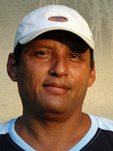I'm not going to beat around the bush. It's been a tough year, y'all.
For us and for our Nicaraguan staff: emotionally, physically and economically.
That's why we're more determined than ever to make it a good year for our patients at the Nueva Vida Clinic.
As our programs have expanded in response to need, our donations have not kept up. We are struggling, and are making it our top priority to keep doing the things that we know are working well.
 One of those wildly successful things is our family planning program at the clinic. We make it free and easy for patients to join, and it's very much in demand.
One of those wildly successful things is our family planning program at the clinic. We make it free and easy for patients to join, and it's very much in demand. “I want to be a mom… but not yet. First I want to finish school.”
“I want to have another baby, but not until my littlest is older.”
 “I can’t afford to have more kids.”As our patients at the Clinic keep telling us, women in Nueva Vida want to plan their families.You can help.
“I can’t afford to have more kids.”As our patients at the Clinic keep telling us, women in Nueva Vida want to plan their families.You can help. Donate $50 to provide family planning for 1 woman for 1 year.
Your gift will provide:
- ob/gyn exam at NV Clinic a check-up with our gynecologist to pick the right method of family planning
- regular visits with our public health nurse for prescription refills
 With your gifts, we can reach our $10,000 goal by the end of Giving Tuesday, December 1st.
With your gifts, we can reach our $10,000 goal by the end of Giving Tuesday, December 1st.Click here to make your tax-deductible donation now.*
Giving Tuesday is movement to give an alternative to the focused consumerism of Black Friday and Cyber Monday, a chance to make a difference.
Together, we can make sure more Nicaraguan women have the freedom to plan their families, to plan their futures.
Thank you.
*No need to wait until December 1st to count for Giving Tuesday! In order for your online donation to reach us in December, please make your donation by Nov. 30th.















































